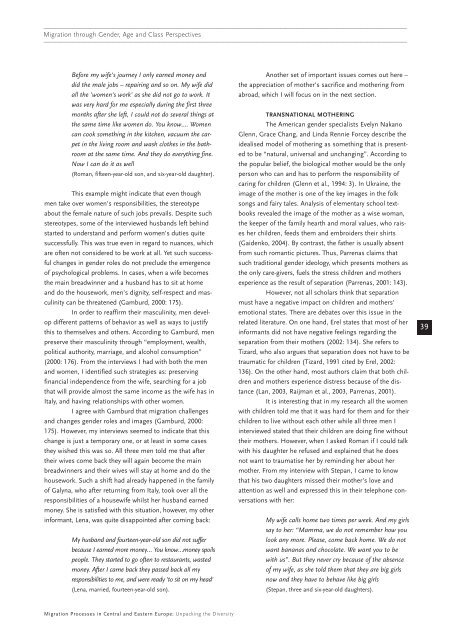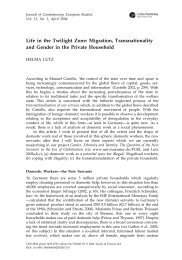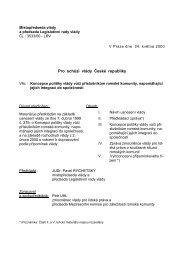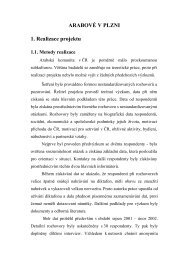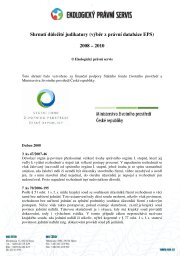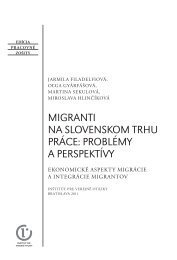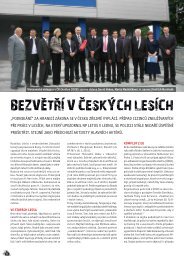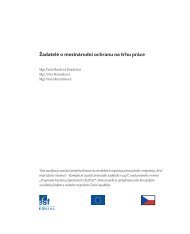Migration Processes in Central and Eastern Europe - Multiple Choices
Migration Processes in Central and Eastern Europe - Multiple Choices
Migration Processes in Central and Eastern Europe - Multiple Choices
You also want an ePaper? Increase the reach of your titles
YUMPU automatically turns print PDFs into web optimized ePapers that Google loves.
———————————————————————————————————————————————————————————————<br />
<strong>Migration</strong> through Gender, Age <strong>and</strong> Class Perspectives<br />
———————————————————————————————————————————————————————————————<br />
Before my wife's journey I only earned money <strong>and</strong><br />
did the male jobs – repair<strong>in</strong>g <strong>and</strong> so on. My wife did<br />
all the 'women's work' as she did not go to work. It<br />
was very hard for me especially dur<strong>in</strong>g the first three<br />
months after she left, I could not do several th<strong>in</strong>gs at<br />
the same time like women do. You know…. Women<br />
can cook someth<strong>in</strong>g <strong>in</strong> the kitchen, vacuum the carpet<br />
<strong>in</strong> the liv<strong>in</strong>g room <strong>and</strong> wash clothes <strong>in</strong> the bathroom<br />
at the same time. And they do everyth<strong>in</strong>g f<strong>in</strong>e.<br />
Now I can do it as well<br />
(Roman, fifteen-year-old son, <strong>and</strong> six-year-old daughter).<br />
This example might <strong>in</strong>dicate that even though<br />
men take over women's responsibilities, the stereotype<br />
about the female nature of such jobs prevails. Despite such<br />
stereotypes, some of the <strong>in</strong>terviewed husb<strong>and</strong>s left beh<strong>in</strong>d<br />
started to underst<strong>and</strong> <strong>and</strong> perform women's duties quite<br />
successfully. This was true even <strong>in</strong> regard to nuances, which<br />
are often not considered to be work at all. Yet such successful<br />
changes <strong>in</strong> gender roles do not preclude the emergence<br />
of psychological problems. In cases, when a wife becomes<br />
the ma<strong>in</strong> breadw<strong>in</strong>ner <strong>and</strong> a husb<strong>and</strong> has to sit at home<br />
<strong>and</strong> do the housework, men's dignity, self-respect <strong>and</strong> mascul<strong>in</strong>ity<br />
can be threatened (Gamburd, 2000: 175).<br />
In order to reaffirm their mascul<strong>in</strong>ity, men develop<br />
different patterns of behavior as well as ways to justify<br />
this to themselves <strong>and</strong> others. Accord<strong>in</strong>g to Gamburd, men<br />
preserve their mascul<strong>in</strong>ity through “employment, wealth,<br />
political authority, marriage, <strong>and</strong> alcohol consumption”<br />
(2000: 176). From the <strong>in</strong>terviews I had with both the men<br />
<strong>and</strong> women, I identified such strategies as: preserv<strong>in</strong>g<br />
f<strong>in</strong>ancial <strong>in</strong>dependence from the wife, search<strong>in</strong>g for a job<br />
that will provide almost the same <strong>in</strong>come as the wife has <strong>in</strong><br />
Italy, <strong>and</strong> hav<strong>in</strong>g relationships with other women.<br />
I agree with Gamburd that migration challenges<br />
<strong>and</strong> changes gender roles <strong>and</strong> images (Gamburd, 2000:<br />
175). However, my <strong>in</strong>terviews seemed to <strong>in</strong>dicate that this<br />
change is just a temporary one, or at least <strong>in</strong> some cases<br />
they wished this was so. All three men told me that after<br />
their wives come back they will aga<strong>in</strong> become the ma<strong>in</strong><br />
breadw<strong>in</strong>ners <strong>and</strong> their wives will stay at home <strong>and</strong> do the<br />
housework. Such a shift had already happened <strong>in</strong> the family<br />
of Galyna, who after return<strong>in</strong>g from Italy, took over all the<br />
responsibilities of a housewife whilst her husb<strong>and</strong> earned<br />
money. She is satisfied with this situation, however, my other<br />
<strong>in</strong>formant, Lena, was quite disappo<strong>in</strong>ted after com<strong>in</strong>g back:<br />
My husb<strong>and</strong> <strong>and</strong> fourteen-year-old son did not suffer<br />
because I earned more money… You know…money spoils<br />
people. They started to go often to restaurants, wasted<br />
money. After I came back they passed back all my<br />
responsibilities to me, <strong>and</strong> were ready 'to sit on my head'<br />
(Lena, married, fourteen-year-old son).<br />
Another set of important issues comes out here –<br />
the appreciation of mother's sacrifice <strong>and</strong> mother<strong>in</strong>g from<br />
abroad, which I will focus on <strong>in</strong> the next section.<br />
TRANSNATIONAL MOTHERING<br />
The American gender specialists Evelyn Nakano<br />
Glenn, Grace Chang, <strong>and</strong> L<strong>in</strong>da Rennie Forcey describe the<br />
idealised model of mother<strong>in</strong>g as someth<strong>in</strong>g that is presented<br />
to be “natural, universal <strong>and</strong> unchang<strong>in</strong>g”. Accord<strong>in</strong>g to<br />
the popular belief, the biological mother would be the only<br />
person who can <strong>and</strong> has to perform the responsibility of<br />
car<strong>in</strong>g for children (Glenn et al., 1994: 3). In Ukra<strong>in</strong>e, the<br />
image of the mother is one of the key images <strong>in</strong> the folk<br />
songs <strong>and</strong> fairy tales. Analysis of elementary school textbooks<br />
revealed the image of the mother as a wise woman,<br />
the keeper of the family hearth <strong>and</strong> moral values, who raises<br />
her children, feeds them <strong>and</strong> embroiders their shirts<br />
(Gaidenko, 2004). By contrast, the father is usually absent<br />
from such romantic pictures. Thus, Parrenas claims that<br />
such traditional gender ideology, which presents mothers as<br />
the only care-givers, fuels the stress children <strong>and</strong> mothers<br />
experience as the result of separation (Parrenas, 2001: 143).<br />
However, not all scholars th<strong>in</strong>k that separation<br />
must have a negative impact on children <strong>and</strong> mothers'<br />
emotional states. There are debates over this issue <strong>in</strong> the<br />
related literature. On one h<strong>and</strong>, Erel states that most of her<br />
<strong>in</strong>formants did not have negative feel<strong>in</strong>gs regard<strong>in</strong>g the<br />
separation from their mothers (2002: 134). She refers to<br />
Tizard, who also argues that separation does not have to be<br />
traumatic for children (Tizard, 1991 cited by Erel, 2002:<br />
136). On the other h<strong>and</strong>, most authors claim that both children<br />
<strong>and</strong> mothers experience distress because of the distance<br />
(Lan, 2003, Raijman et al., 2003, Parrenas, 2001).<br />
It is <strong>in</strong>terest<strong>in</strong>g that <strong>in</strong> my research all the women<br />
with children told me that it was hard for them <strong>and</strong> for their<br />
children to live without each other while all three men I<br />
<strong>in</strong>terviewed stated that their children are do<strong>in</strong>g f<strong>in</strong>e without<br />
their mothers. However, when I asked Roman if I could talk<br />
with his daughter he refused <strong>and</strong> expla<strong>in</strong>ed that he does<br />
not want to traumatise her by rem<strong>in</strong>d<strong>in</strong>g her about her<br />
mother. From my <strong>in</strong>terview with Stepan, I came to know<br />
that his two daughters missed their mother's love <strong>and</strong><br />
attention as well <strong>and</strong> expressed this <strong>in</strong> their telephone conversations<br />
with her:<br />
My wife calls home two times per week. And my girls<br />
say to her: “Mamma, we do not remember how you<br />
look any more. Please, come back home. We do not<br />
want bananas <strong>and</strong> chocolate. We want you to be<br />
with us”. But they never cry because of the absence<br />
of my wife, as she told them that they are big girls<br />
now <strong>and</strong> they have to behave like big girls<br />
(Stepan, three <strong>and</strong> six-year-old daughters).<br />
39<br />
<strong>Migration</strong> <strong>Processes</strong> <strong>in</strong> <strong>Central</strong> <strong>and</strong> <strong>Eastern</strong> <strong>Europe</strong>: Unpack<strong>in</strong>g the Diversity


